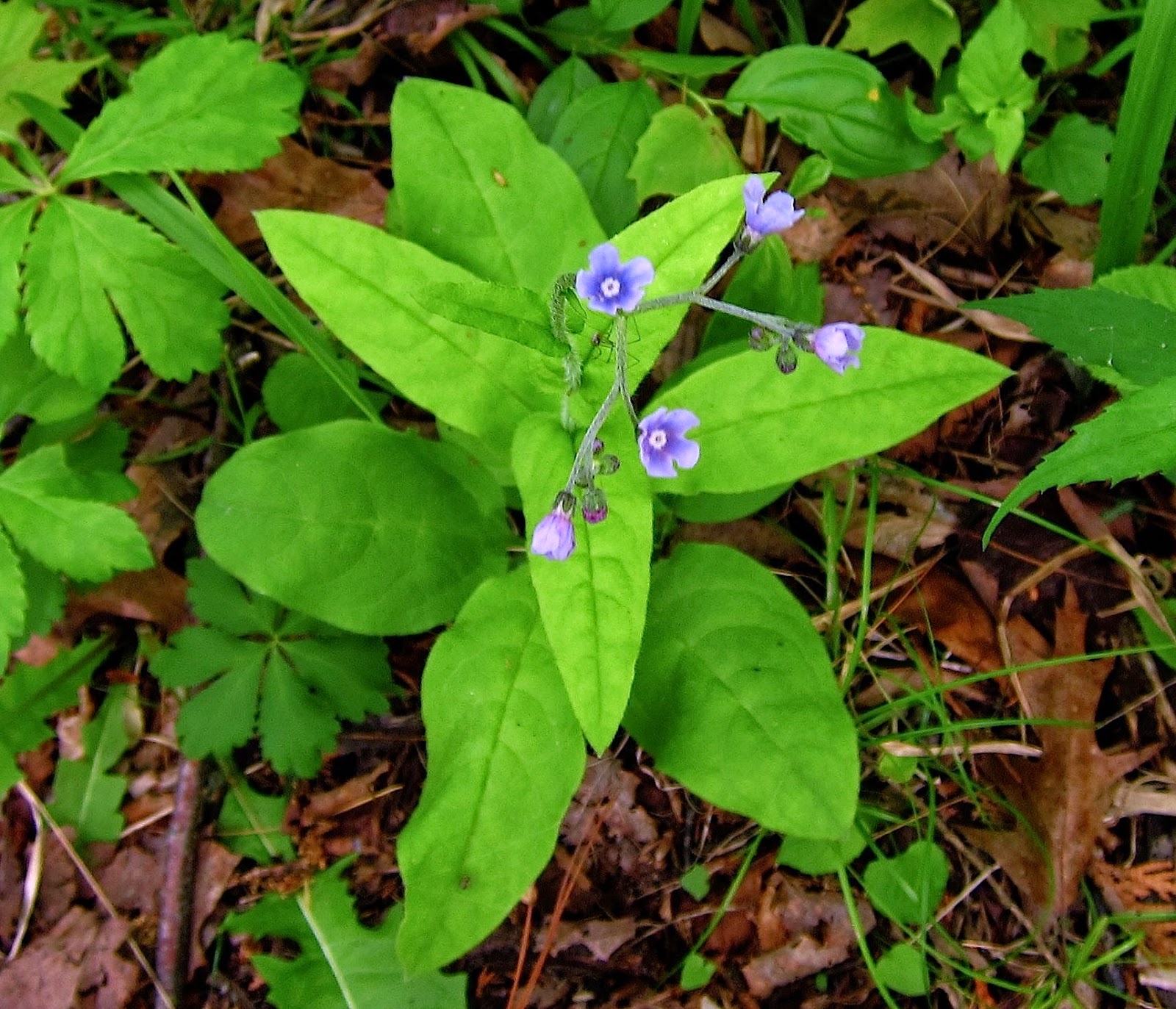Offered by the Adirondack Botanical Society and led by ecologists Raymond Curran and Ken Adams, the trip across the water was made possible with the assistance of SUNY Plattsburgh, which provided free-of-charge a boat and pilot to carry two loads of six people at a time across from a dock at the Valcour Conference Center in Peru. (Here, Elizabeth Lee, wildlife guide and one of the foray's participants, rests on the bow of the boat.)
Once we had all convened on the sandy western shore of the approximately thousand-acre island, we set off on the wooded trails that follow the shore. Although Valcour Island is only about two miles long and one mile across, our trip leaders constantly sought to hurry us along, hoping to reach the site where the Ram's-head Lady Slippers had last been seen, before our boat returned to carry us home. But of course, botanizers being botanizers, we often had to stop along the way to honor the many wonderful plants we encountered along the trail.
The limestone substrate of Valcour Island gave many participants the opportunity to witness plants they would never see in other parts of the Adirondacks, which consists mostly of granitic rocks. Here, Rachel Schultz, a wetland ecology professor from SUNY Plattsburgh, examines the Walking Fern (Asplenium rhizophyllum) that populates this boulder along with other lime-loving plants, such as the dainty Fragile Fern (Cystopteris fragilis) that carpets the top of the boulder.
Here's a closer look at that most un-fernlike Walking Fern that was making its way across the expanse of that moss-covered boulder.
The presence of this old stone house, long abandoned, gave evidence that this island, now preserved as a nature sanctuary, once was home to farmers and their animals and fields.
Here and there, our densely wooded trails opened up to reveal the splendid blue waters of Lake Champlain and the distinctive limestone shelves that form the shore along parts of Valcour Island.
Ah! Words fail me! This is the treasure we came to seek, the rare and exquisite Ram's-head Lady Slipper.
I never would have been able to find this tiny plant without the aid of others with better eyesight. To provide some idea of how small this lady slipper is, here's Eric Wood trying to get a focus on it. (I hope he had better luck than I did. I must have thrown away over 50 shots before I found the not-so-perfect ones I posted above.)
Luckily, once we had found our rare jewel, we were granted the time to take plenty of well-focused photographs of it. This was not the case for my other "firsts" I encountered along the way and had to photograph on the fly. This was the best I managed to capture of the pretty, blue-flowered Northern Wild Comfrey (Cynoglossum virginianum var. boreale), a plant that's listed as "Endangered" in New York State but which was abundant on Valcour Island.
Not quite so abundant, but we did find a number of specimens of another rare plant, Golden Corydalis (Corydalis aurea ssp. aurea), which is listed as "Threatened" in New York.
I would have passed right by this pea-family plant if Eric Wood had not called it to my attention, telling me that he believed it was Pale Vetchling (Lathyrus ochroleucus), another unusual plant that is listed as "Rare" in our state, but which was very much at home out here on this island.
I thought this was some kind of Meadow Rue until I noticed its vining habit and was told by one of my companions, Doug McGrady, that he believed it was Climbing Fumitory (Adlumia fungosa). Although this is not exactly a rare plant in New York, it sure was a new one for me.
Another new one for me was Seneca Snakeroot (Polygala senega), a plant that's "demonstrably secure" in the state even though I have never seen it in all my wanderings. Perhaps that could be because of its diminutive size and rather cryptic coloration.
If I ever do find it again, I think I will call it by its scientific name, because its common name is too close to an entirely different species of plant, the Sanicle Snakeroot (Sanicula marilandica). Not to mention the Rattlesnake Roots (Prenanthes ssp.). Or the White Snakeroots (Ageratina ssp.). Too many "snakes" down there in the grass. I'll call it Polygala. Or maybe White Milkwort. It's in the Milkwort Family and it's white.
Just look at all the happy smiles! We sure had a lot to smile about, having found so many wonderful plants on such a splendid island on such a beautiful day. We might have been a bit muddy, thanks to trails saturated by downpours the night before, but that was just part of the fun. Thanks Ray and Ken (back row, third and fourth from left) for organizing and conducting such a great trip. And thanks to all the rest of these happy plant people, whose sharp eyesight and extensive knowledge added so much to the experience. Hope to see you all again next year!
















4 comments:
Wow! A successful adventure! Your shoreline pic looks so much like the Bruce Peninsula here, which is all limestone. The Ram's Head grows at the Dorcas Bay nature reserve here. Glad you were successful!
How wonderful that you got to visit this place with experienced guides. I often thought of going there (mostly for a boating adventure and the wildlife viewing, including the huge heron rookery). Now you have given me even more reasons to visit. Congratulations on all the new species!
What an incredible place, Jackie! I'm so happy you finally got to see the ram's head lady's slippers. They are so tiny it's almost unbelievable, even where they are right in front of you! Wish I could have been there to cherish this island paradise with you.
I wanna go! Let me know when the next trip is planned...maybe I can make a quick trip out to join. :)
Post a Comment